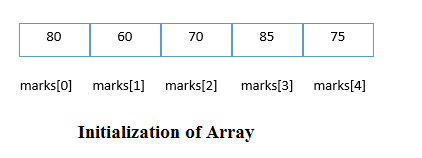TheDeveloperBlog.com
C-Sharp | Java | Python | Swift | GO | WPF | Ruby | Scala | F# | JavaScript | SQL | PHP | Angular | HTML
C Array
C Array with programming examples for beginners and professionals, Advantage and disadvantage of C Array, Declaration of C Array, Initialization of C Array, C Array: Declaration with Initialization, covering concepts.
C ArrayAn array is defined as the collection of similar type of data items stored at contiguous memory locations. Arrays are the derived data type in C programming language which can store the primitive type of data such as int, char, double, float, etc. It also has the capability to store the collection of derived data types, such as pointers, structure, etc. The array is the simplest data structure where each data element can be randomly accessed by using its index number. C array is beneficial if you have to store similar elements. For example, if we want to store the marks of a student in 6 subjects, then we don't need to define different variables for the marks in the different subject. Instead of that, we can define an array which can store the marks in each subject at the contiguous memory locations. By using the array, we can access the elements easily. Only a few lines of code are required to access the elements of the array. Properties of ArrayThe array contains the following properties.
Advantage of C Array1) Code Optimization: Less code to the access the data. 2) Ease of traversing: By using the for loop, we can retrieve the elements of an array easily. 3) Ease of sorting: To sort the elements of the array, we need a few lines of code only. 4) Random Access: We can access any element randomly using the array. Disadvantage of C Array1) Fixed Size: Whatever size, we define at the time of declaration of the array, we can't exceed the limit. So, it doesn't grow the size dynamically like LinkedList which we will learn later. Declaration of C Array
We can declare an array in the c language in the following way. data_type array_name[array_size]; Now, let us see the example to declare the array. int marks[5]; Here, int is the data_type, marks are the array_name, and 5 is the array_size. Initialization of C Array
The simplest way to initialize an array is by using the index of each element. We can initialize each element of the array by using the index. Consider the following example. marks[0]=80;//initialization of array marks[1]=60; marks[2]=70; marks[3]=85; marks[4]=75; 
C array example
#include<stdio.h>
int main(){
int i=0;
int marks[5];//declaration of array
marks[0]=80;//initialization of array
marks[1]=60;
marks[2]=70;
marks[3]=85;
marks[4]=75;
//traversal of array
for(i=0;i<5;i++){
printf("%d \n",marks[i]);
}//end of for loop
return 0;
}
Output 80 60 70 85 75 C Array: Declaration with Initialization
We can initialize the c array at the time of declaration. Let's see the code.
int marks[5]={20,30,40,50,60};
In such case, there is no requirement to define the size. So it may also be written as the following code.
int marks[]={20,30,40,50,60};
Let's see the C program to declare and initialize the array in C. #include Output 20 30 40 50 60 C Array Example: Sorting an arrayIn the following program, we are using bubble sort method to sort the array in ascending order.
#include<stdio.h>
void main ()
{
int i, j,temp;
int a[10] = { 10, 9, 7, 101, 23, 44, 12, 78, 34, 23};
for(i = 0; i<10; i++)
{
for(j = i+1; j<10; j++)
{
if(a[j] > a[i])
{
temp = a[i];
a[i] = a[j];
a[j] = temp;
}
}
}
printf("Printing Sorted Element List ...\n");
for(i = 0; i<10; i++)
{
printf("%d\n",a[i]);
}
}
Program to print the largest and second largest element of the array.
#include<stdio.h>
void main ()
{
int arr[100],i,n,largest,sec_largest;
printf("Enter the size of the array?");
scanf("%d",&n);
printf("Enter the elements of the array?");
for(i = 0; i<n; i++)
{
scanf("%d",&arr[i]);
}
largest = arr[0];
sec_largest = arr[1];
for(i=0;i<n;i++)
{
if(arr[i]>largest)
{
sec_largest = largest;
largest = arr[i];
}
else if (arr[i]>sec_largest && arr[i]!=largest)
{
sec_largest=arr[i];
}
}
printf("largest = %d, second largest = %d",largest,sec_largest);
}
Next TopicTwo Dimensional Array in C
|
Related Links:
- C# this
- C# static
- C# static class
- C# static constructor
- C# Main Thread
- C# Thread Sleep
- C# Structs
- C# Enum
- C# Properties
- C# Aggregation
- C# Member Overloading
- C# Method Overriding
- C# Base
- Learn C Programming Language Tutorial
- C# Polymorphism
- C# Sealed
- C# Abstract
- C# Interface
- C# Access Modifiers
- C# Namespaces
- C# Encapsulation
- C# Strings
- C# Exception Handling
- C# try-catch
- C# finally
- C# User Defined Exceptions
- C# Checked and Unchecked
- C# SystemException
- C# FileStream
- C# StreamWriter
- C# StreamReader
- C# TextWriter
- C# TextReader
- C# BinaryWriter
- C# FileInfo
- C# DirectoryInfo
- C# BinaryReader
- C# StringWriter
- C# StringReader
- C# Serialization
- C# Deserialization
- C# System.IO Namespace
- C# Collections
- C# List
- C# HashSet
- C# SortedSet
- C# Stack
- C# Queue
- C# LinkedList
- C# Dictionary
- C# Inheritance
- C# SortedDictionary
- C# SortedList
- C# Generics
- C# Delegates
- C# Reflection
- C# Anonymous Function
- C# Multithreading
- C# Thread Life Cycle
- C# Thread Class
- C# Threading Example
- C# Thread Abort
- C# ThreadPriority
- C# Thread Synchronization | C# Lock
- C Identifiers
- C Switch Statement
- C break statement
- C Array
- C Operators
- C Format Specifier
- C Pointers
- C Pointer to Pointer
- C if else statement
- C Programming Interview Questions (2021)
- C Loop
- C# Jagged Arrays
- C continue statement
- C goto statement
- C String Functions
- C strlen() function
- C strcpy() function
- C strcat() function
- C Union
- C vs C++
- Top 26 C# Interview Questions (2021)
- C strcmp() function
- C strrev() function
- C strlwr() function
- C strupr() function
- C strstr() function
- C Math Functions
- C# Thread Join
- C# Thread Name
- C Preprocessor
- C Macros
- C #include
- C #define
- C #undef
- C #ifdef
- C #ifndef
- C #if
- C #else
- C #error
- Learn C# Tutorial
- C #pragma
- C Expressions
- C Data Segments
- C Programs
- C# if else
- C# Do While Loop
- C Program to reverse number
- C Program to swap two numbers without using third variable
- C Program to print hello without semicolon
- C Program without main()
- C Program to print Alphabet Triangle
- C# Example
- C Program to convert Decimal to Binary
- C Program to convert Number in Characters
- C Strings
- C gets() and puts()
- C Program to print Number Triangle
- C Program to generate Fibonacci Triangle
- C# switch
- C# For Loop
- C# While Loop
- C# Break Statement
- C# Continue Statement
- C# Array to Function
- C# Multidimensional Array
- C# Goto Statement
- C# Comments
- C# Function
- C# Call By Value
- C# Call By Reference
- C# Out Parameter
- C# Arrays
- C# Params
- C# Array Class
- C# Command Line Arguments
- C# Object and Class
- C# Constructor
- C# Destructor


